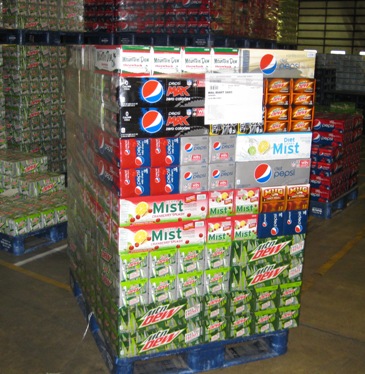PepsiCo Beverages Canada announces the 7UP EcoGreen™ bottle, Canada’s – and North America’s – first soft drink bottle made from 100% recycled PET plastic
Beverages Canada announces the 7UP EcoGreen™ bottle, Canada’s – and North America’s – first soft drink bottle made from 100% recycled PET plastic .
.
The development of the 7UP EcoGreen bottle is a significant achievement for PepsiCo and a breakthrough for the Canadian beverage sector because the company has identified a way to couple existing technology with the best sources of rPET and best-in-class processing techniques to produce a 100% rPET, food-grade bottle that meets all regulatory requirements and is of the highest quality. Creating a bottle made from 100% recycled plastic for soft drinks is more challenging than creating a bottle for non-carbonated beverages because of the stress on materials from carbonation pressure.
By introducing the 7UP EcoGreen bottle in Canada, PepsiCo Beverages Canada will reduce the amount of virgin plastic used by approximately six million pounds over the course of one year. Studies published by the Association for Post-Consumer Plastic Recyclers in 2010, estimate this reduced use of virgin plastic will lead to a reduction of more than 30% in greenhouse gas emissions and more than 55% in energy use, based on current 7UP production levels.
A step beyond Naked Juice
It’s a stepwise development for PepsiCo: The technology is identical to that used for last year’s Naked Juice reNEWa bottle in a non-carbonated application, Denise Lefebvre, PepsiCo’s VP, Global Beverage Packaging, informsFood & Beverage Packaging.
“That’s no small technical feat getting to the right quality post-consumer recycle content, particularly for a carbonated soft drink bottle that has so many design requirements from pressure and product retention and utility in the marketplace,” she says. “We see a continued consumer demand for this kind of packaging.”
The 7UP EcoGreen bottle will be available across all 7UP and Diet 7UP package sizes beginning in early August, and will look and feel like any other PET plastic soft drink bottle. The bottle will be produced in multiple PepsiCo manufacturing facilities across Canada. The company invested $1 million in production enhancements in its facilities, including resin handling systems and inspection systems. Although there will be an incremental cost to produce the 7UP EcoGreen bottle, PepsiCo Beverages Canada
bottle will be available across all 7UP and Diet 7UP package sizes beginning in early August, and will look and feel like any other PET plastic soft drink bottle. The bottle will be produced in multiple PepsiCo manufacturing facilities across Canada. The company invested $1 million in production enhancements in its facilities, including resin handling systems and inspection systems. Although there will be an incremental cost to produce the 7UP EcoGreen bottle, PepsiCo Beverages Canada  plans to price 7UP beverages on par with other soft drink brands.
plans to price 7UP beverages on par with other soft drink brands.
PepsiCo Beverages Canada’s long-term plan is to increase the use of bottles made from 100% recycled plastic. Currently, PepsiCo leads the industry by incorporating an average of 10% rPET in its primary soft drink bottles in Canada and the U.S.
The development of the 7UP EcoGreen bottle is a significant achievement for PepsiCo and a breakthrough for the Canadian beverage sector because the company has identified a way to couple existing technology with the best sources of rPET and best-in-class processing techniques to produce a 100% rPET, food-grade bottle that meets all regulatory requirements and is of the highest quality. Creating a bottle made from 100% recycled plastic for soft drinks is more challenging than creating a bottle for non-carbonated beverages because of the stress on materials from carbonation pressure.
By introducing the 7UP EcoGreen bottle in Canada, PepsiCo Beverages Canada will reduce the amount of virgin plastic used by approximately six million pounds over the course of one year. Studies published by the Association for Post-Consumer Plastic Recyclers in 2010, estimate this reduced use of virgin plastic will lead to a reduction of more than 30% in greenhouse gas emissions and more than 55% in energy use, based on current 7UP production levels.
A step beyond Naked Juice
It’s a stepwise development for PepsiCo: The technology is identical to that used for last year’s Naked Juice reNEWa bottle in a non-carbonated application, Denise Lefebvre, PepsiCo’s VP, Global Beverage Packaging, informsFood & Beverage Packaging.
“That’s no small technical feat getting to the right quality post-consumer recycle content, particularly for a carbonated soft drink bottle that has so many design requirements from pressure and product retention and utility in the marketplace,” she says. “We see a continued consumer demand for this kind of packaging.”
The 7UP EcoGreen
PepsiCo Beverages Canada’s long-term plan is to increase the use of bottles made from 100% recycled plastic. Currently, PepsiCo leads the industry by incorporating an average of 10% rPET in its primary soft drink bottles in Canada and the U.S.



